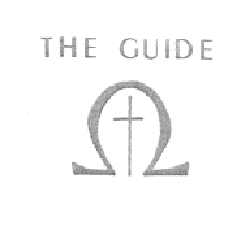
 |
THE FAST
RESEARCH ASSEMBLY
SUMMER '72
an exercise in
spiritual
poverty
on behalf
of all people
We have been concerned with the intensification of
interior discipline that will be life or death to the movement
over the 20year march. The wearing of the cross as a sign
of chastity, the night watch as a sign of obedience, and nowthe
Fast as a sign of poverty are three ways we are experimenting
with recovering corporate vows, or the interiorizing of corporateness.
The Fast has to do with spiritual detachment, the intentional
withdrawal from life's many attachments in order to be free to
follow the Word. More than the previous two exercises the Fast
confronts the participant with his own frailty and contingency,
causing images of significance to fade, and throwing him upon
the only unending concern -- the mystery of life and death. Thus
the Fast gives external indication of the final commitment, the
decision to travel the whole distance.
As we trace the historical journey of the Fast and
the Feast, we have to begin with the dawn of consciousness of
man, when the animal activity of taking in sustenance was selfconsciously
developed into a pattern of fasting and feasting. That doubtlessly
exploded the gift of the meal within the community. The church
further discovered the formation tool of the Fast as training
in spirit discipline; at the same time she appropriated the feast
in the calendar as a major celebrative event. It was understood
that a man engaging in a Fast as a religious exercise cast out
demons, particularly the one of attachment, unblocking him in
the freedom of 0 a spirit to be creative intentionality A Fast
was marked by the return to feasting, which now becomes a radical
embracing of the bounty of life.
The experience of the Fast is unique to each person,
but wisdom from previous fasts indicates that certain dynamics
can be expected. The absence of meals will disrupt the day's rhythm,
resulting in hunger pangs at strange times, tedium, and
a physical lassitude. One's spirit vacillates between deep restlessness
and a vacant slothfulness in the midst of the corporate missional
thrust. The senses are intensified; in experiences ranging from
penetrating lucidity to euphoria or passionate engagement. Critical
in the entire experience is the awareness of the double occasion
of the Fast; over a temporal, particular reality in history and
about the eternal or one's relation to final mystery.
The scriptures describe fully the context within which fasting goes on. There is the story of Jesus in the desert as the most obvious example of the effects, the temptations, and the decision in the experience of the Fast. Jesus stands as the Word which gives permission to selfconsciously fast or feast on behalf of all of suffering mankind. He related fasting to the casting out of demons when he pointed out to his disciples that "some demons can be cast out only by prayer and fasting." Also, the resurrectional life is portrayed through the imagery of the feasting on the other side of the fast -- the risen Christ breaks bread and eats fish, though as the teed one he needs no food. Finally, he ascends to prepare places for all the disciples at the eternal feasting on the Spirit that apes on in the Other World in the midst of this world.
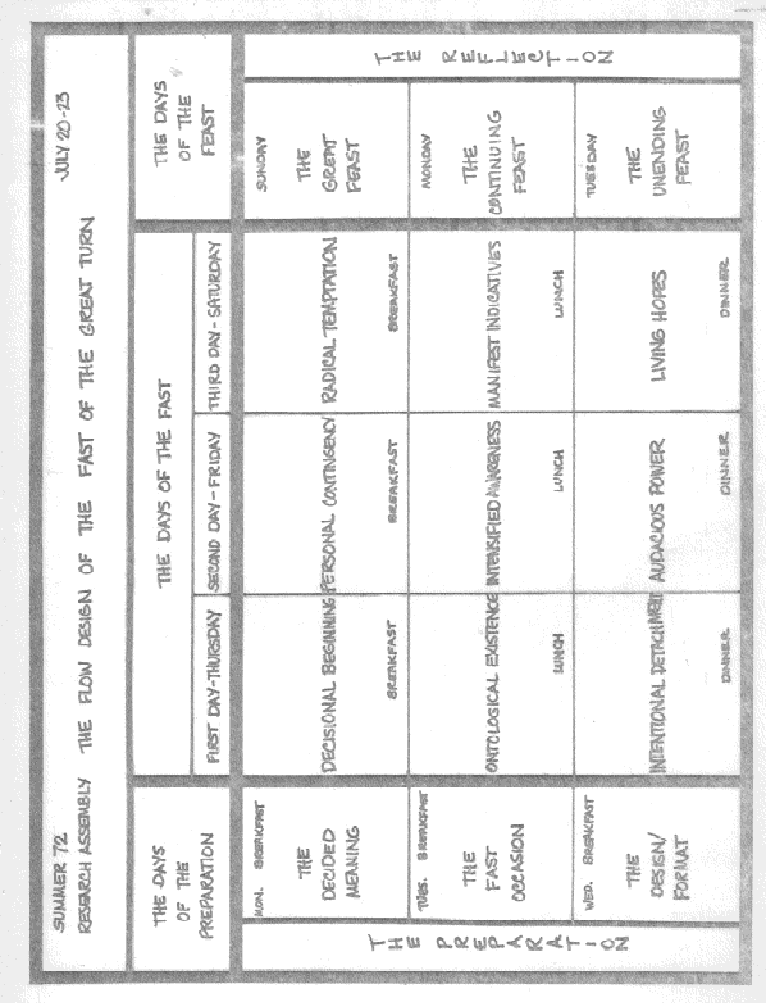 |
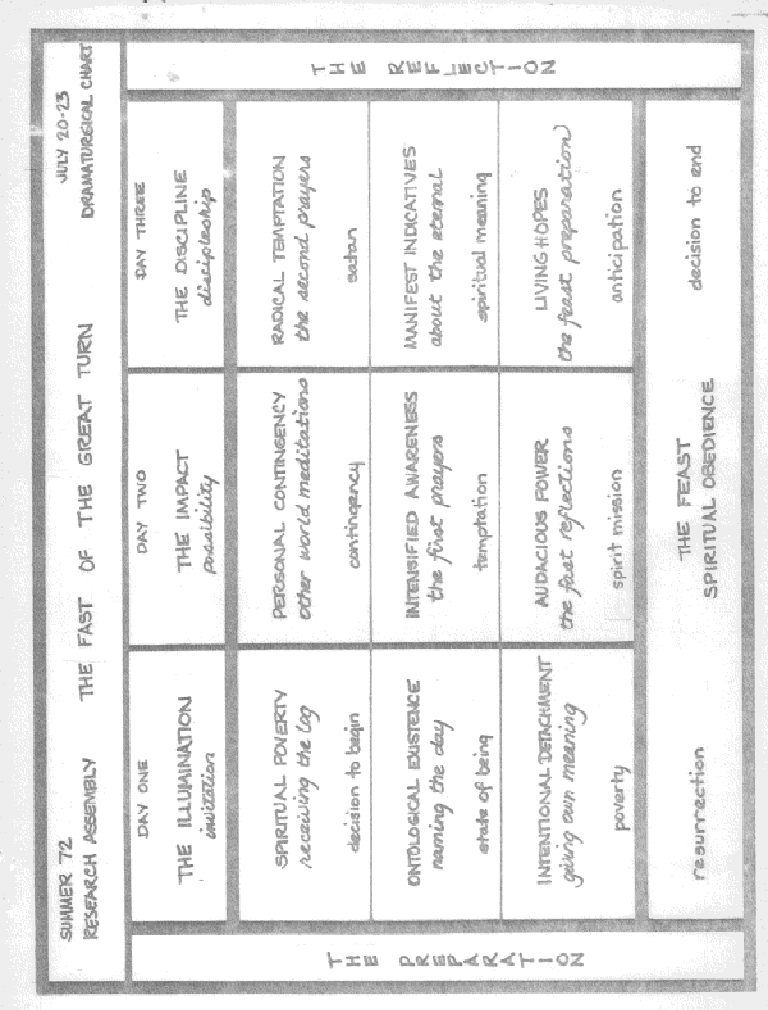 |
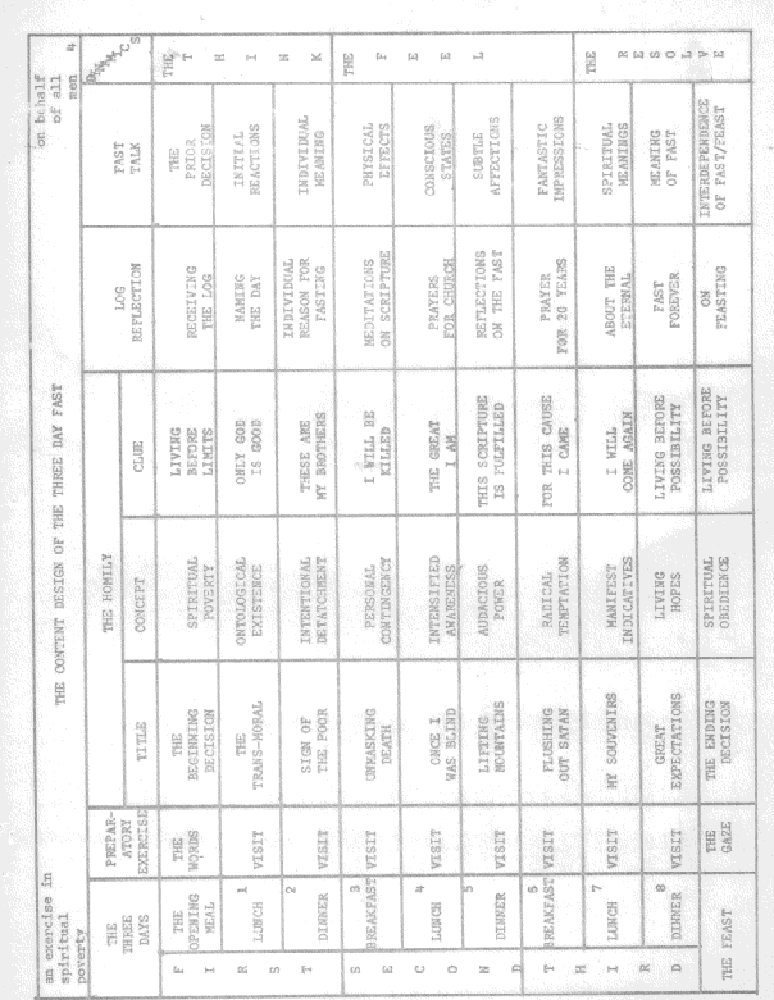 |
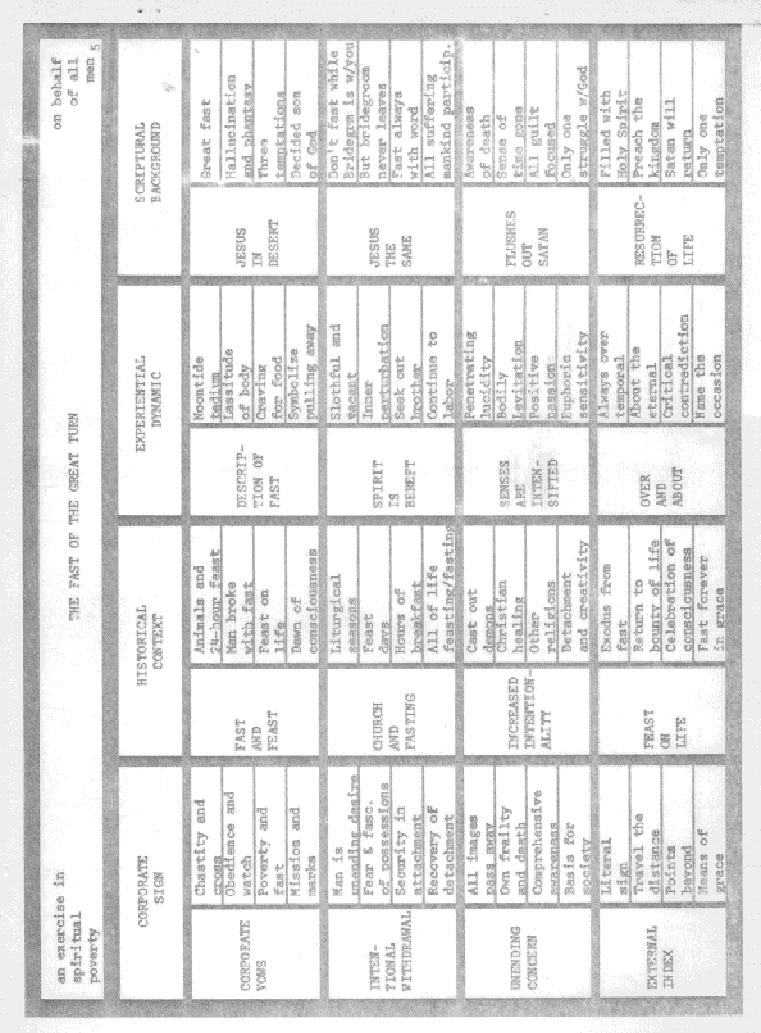 |
an exercise in spiritual poverty on behalf of all people
6:30
6:55
7:05
7:30
THURSDAY OPENING MEAL
Breakfast Opening Singing Accountability/Absolution Meal Ritual/Prayer
Words of Jesus (Congregation Guide)
News Conversations (Optional relative to time)
Fast Context
I. Fasting is an everyday reality
A. A spirit man must have thought of the word breakfast" first.
B. Every culture has fasted. Indeed all life is either fasting or feasting -- you break it each morning. We've been fasting and feasting ever since we wore yanked out of the womb. We're alive today because we did that.
II. Fasting is relative to more than food
A. Fasting is pulling away from food. Like fly paper
or taffy -- it is hard to got unstuck. Here it is that temptation
enters.
B. We get a preview of combat with Satan. It'll come in soup -- tomato soup. We'll crave solidity -- it will be a struggle to get away from the fly paper.
C. Fast will flush the devil into the open and focus spirit struggle on one point -- Satan.
III. Fasting is "over" and "about"
an exercise in spiritual poverty
on behalf of all
people
THURSDAY OPENING MEAL 7a
7:20
7:25
IV. Fasting is to fun
A. Fasting has nothing to do with piety or morality, for it ia ontological.
B. Structure out phariseeism in you and me. Remember you 'ra not going on a diet -- you might even gain weight.
C. Have fun with fast. Laugh at yourself when you find your mind wandering toward Demars across the street -- or a chocolate bar in your suitcase.
D. Relax -- Don't take self too seriously. You've a brand new tioe in which to atyle being.
Receiving the Log
Log's which are already at their places are turned to. Walk participants thru the log, giving instructiona as to how to use it.
"I call into being the Fast of the Great Turn in the name of the Father, and of the Son and of the Holy Ghost. Amen." Group responds: ·Amen " .
Announcements/Assignments
(one day wonder, 5th City, laundry, banking, celebration)
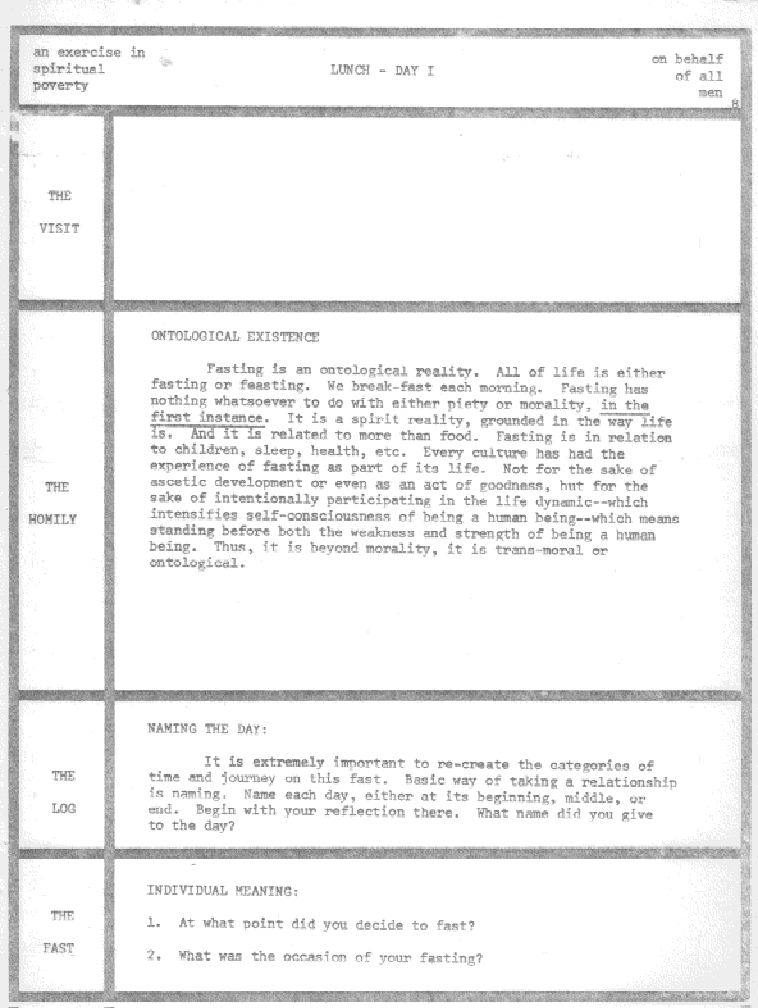 |
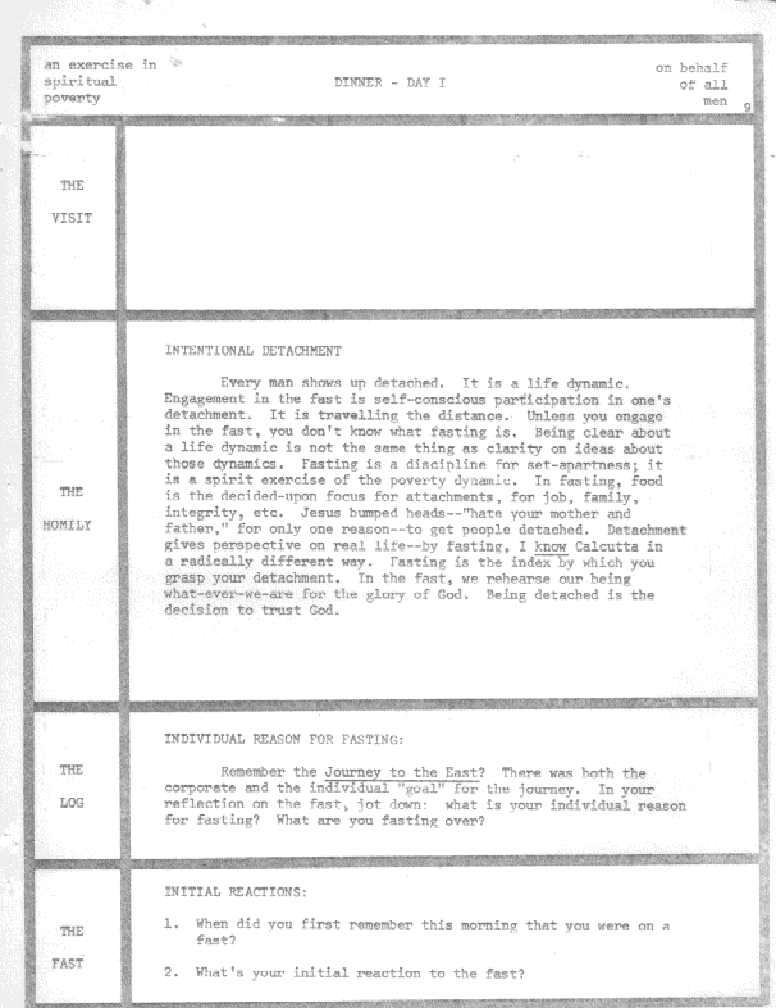 |
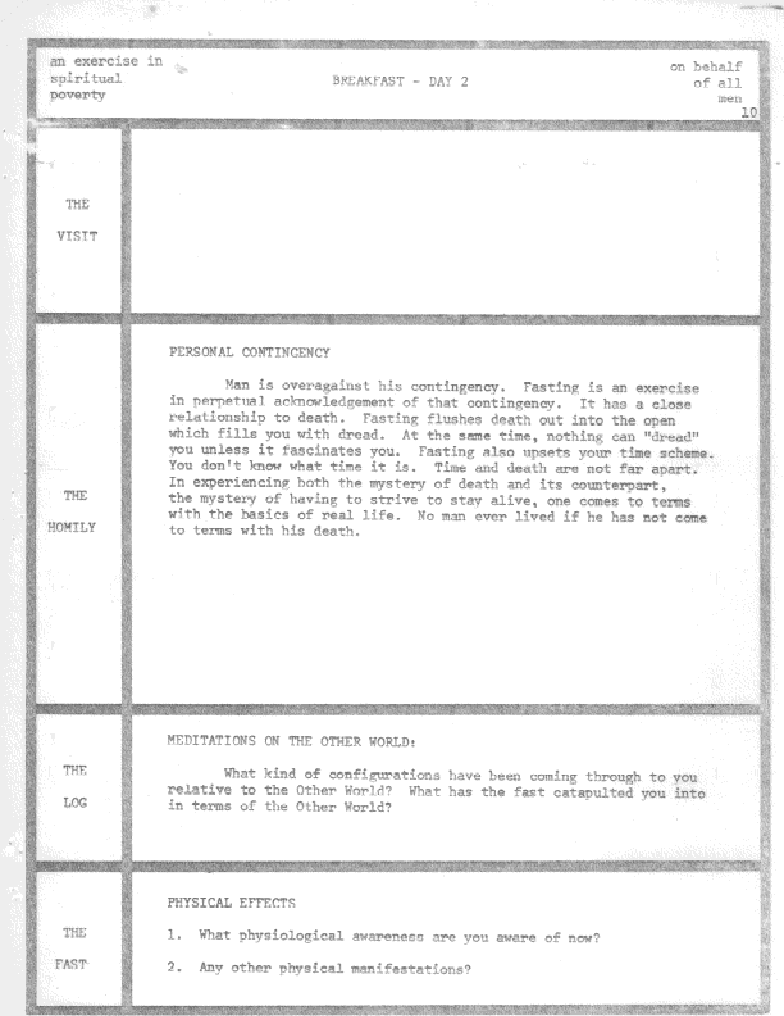 |
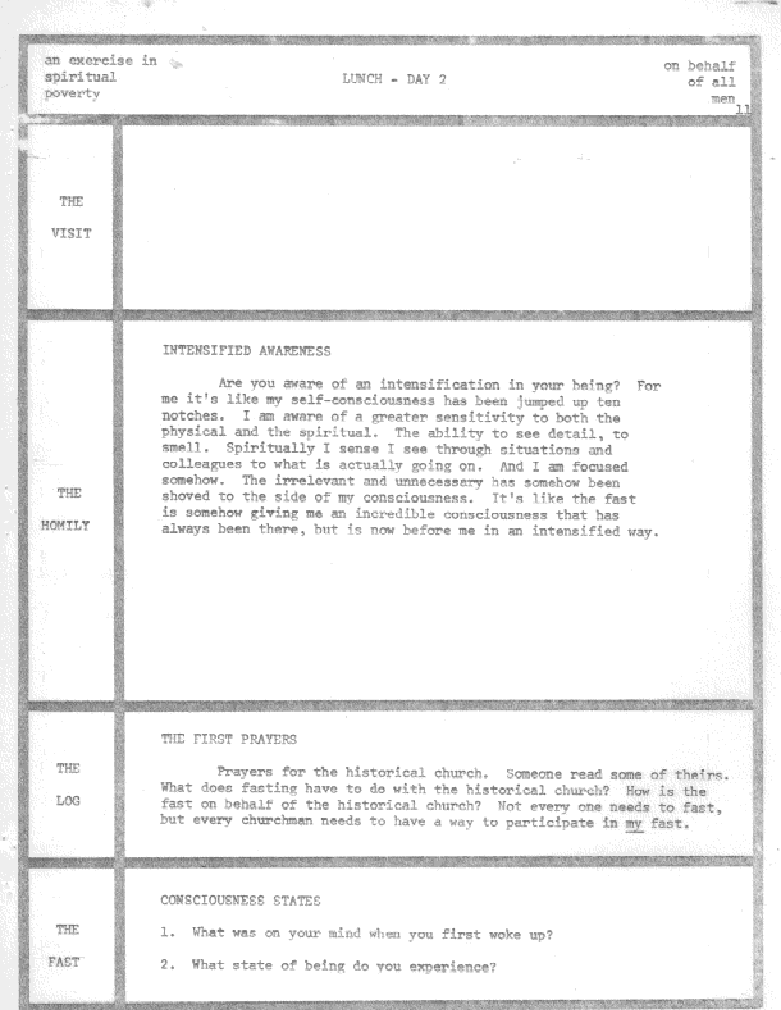 |
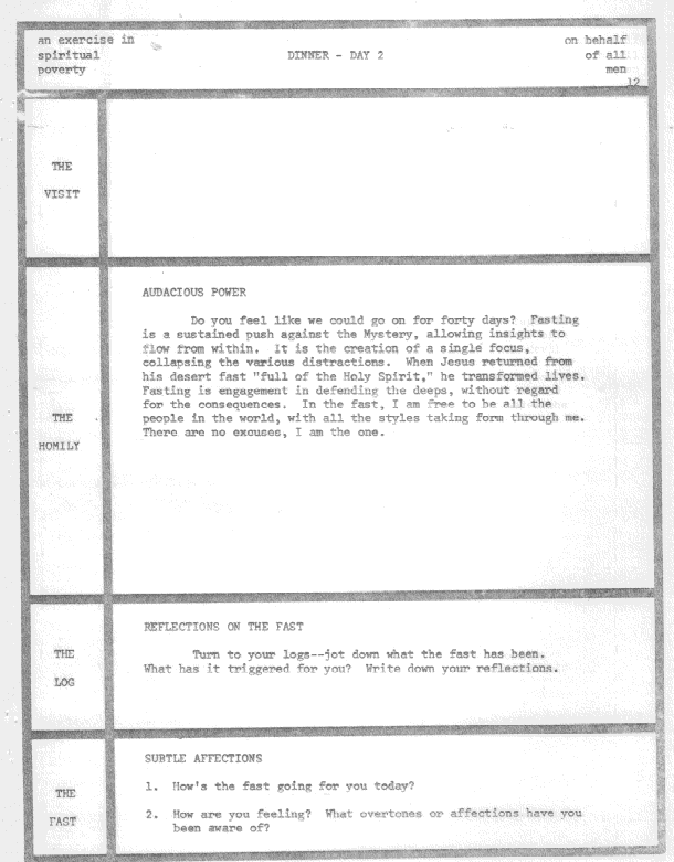 |
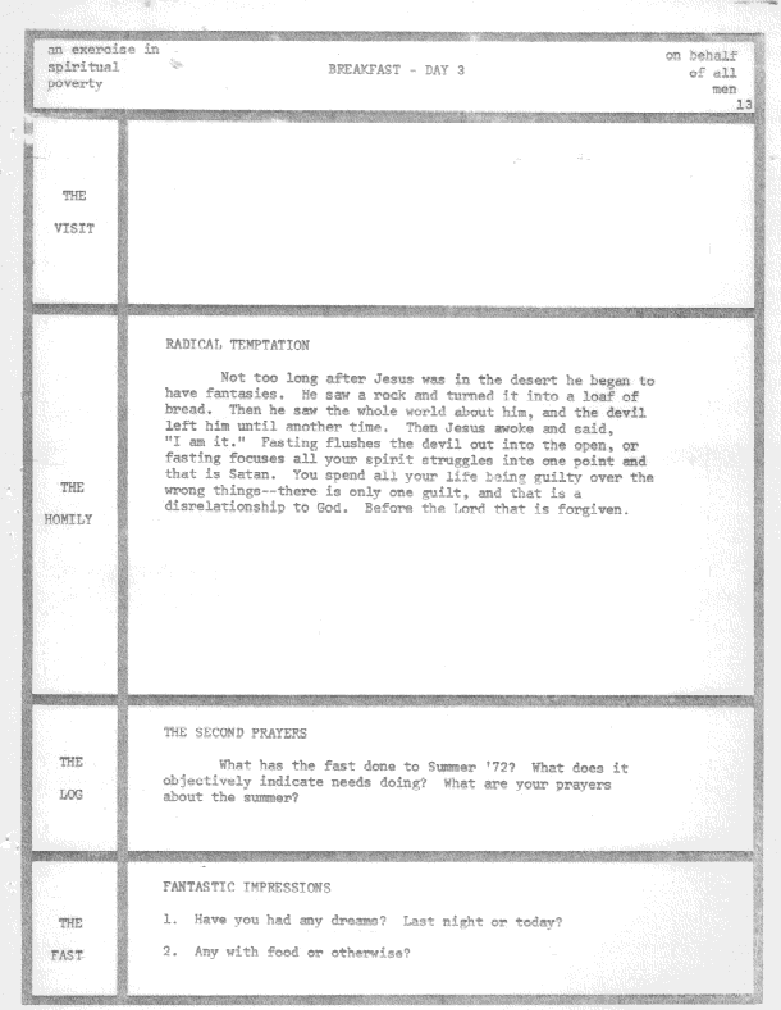
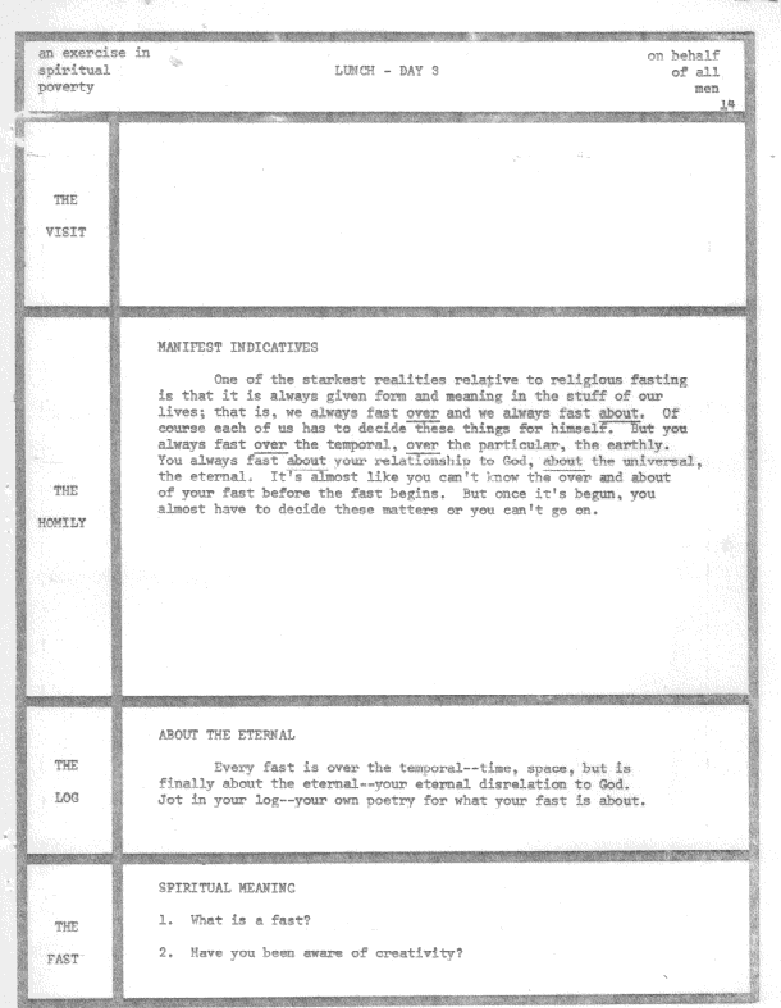
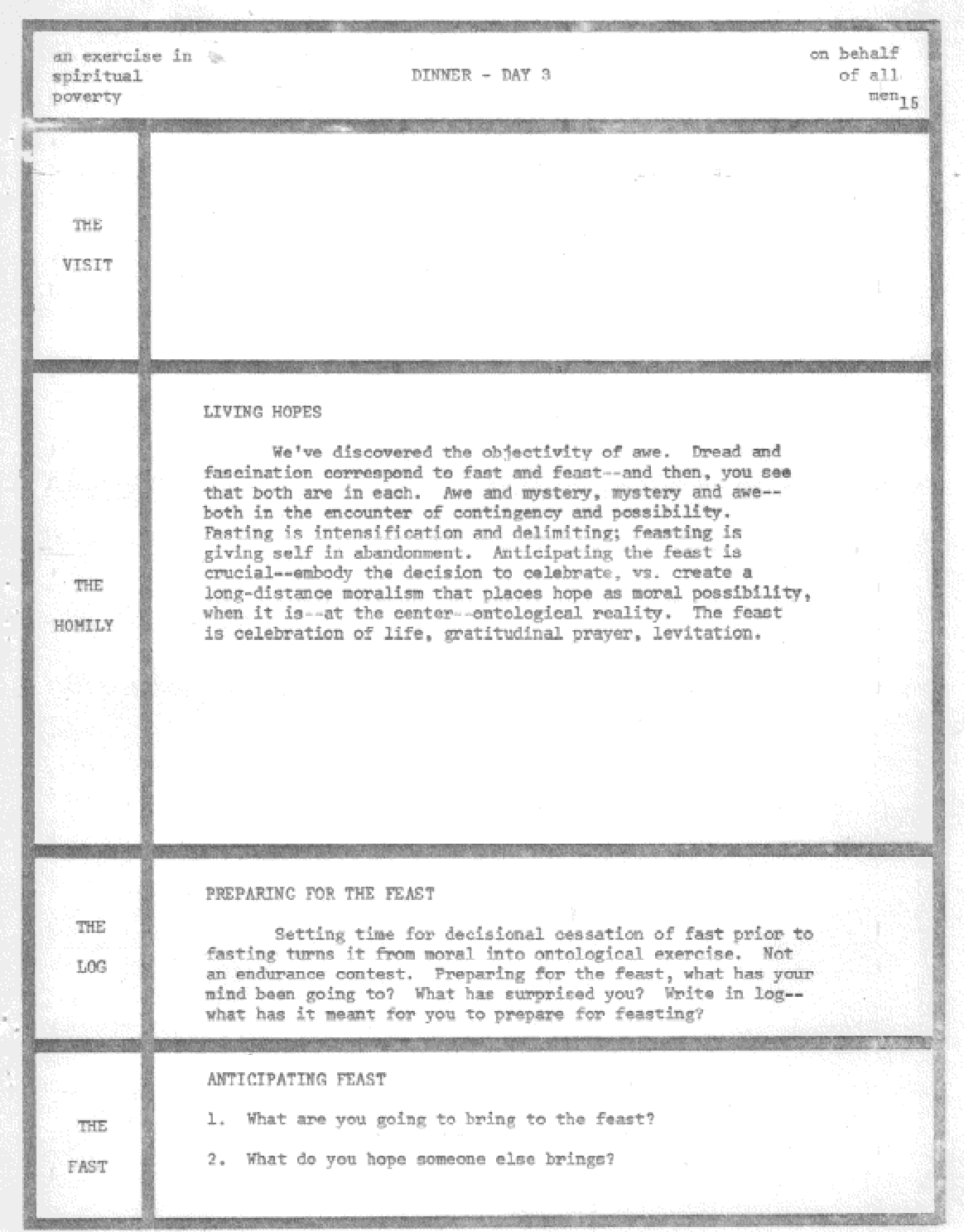
|
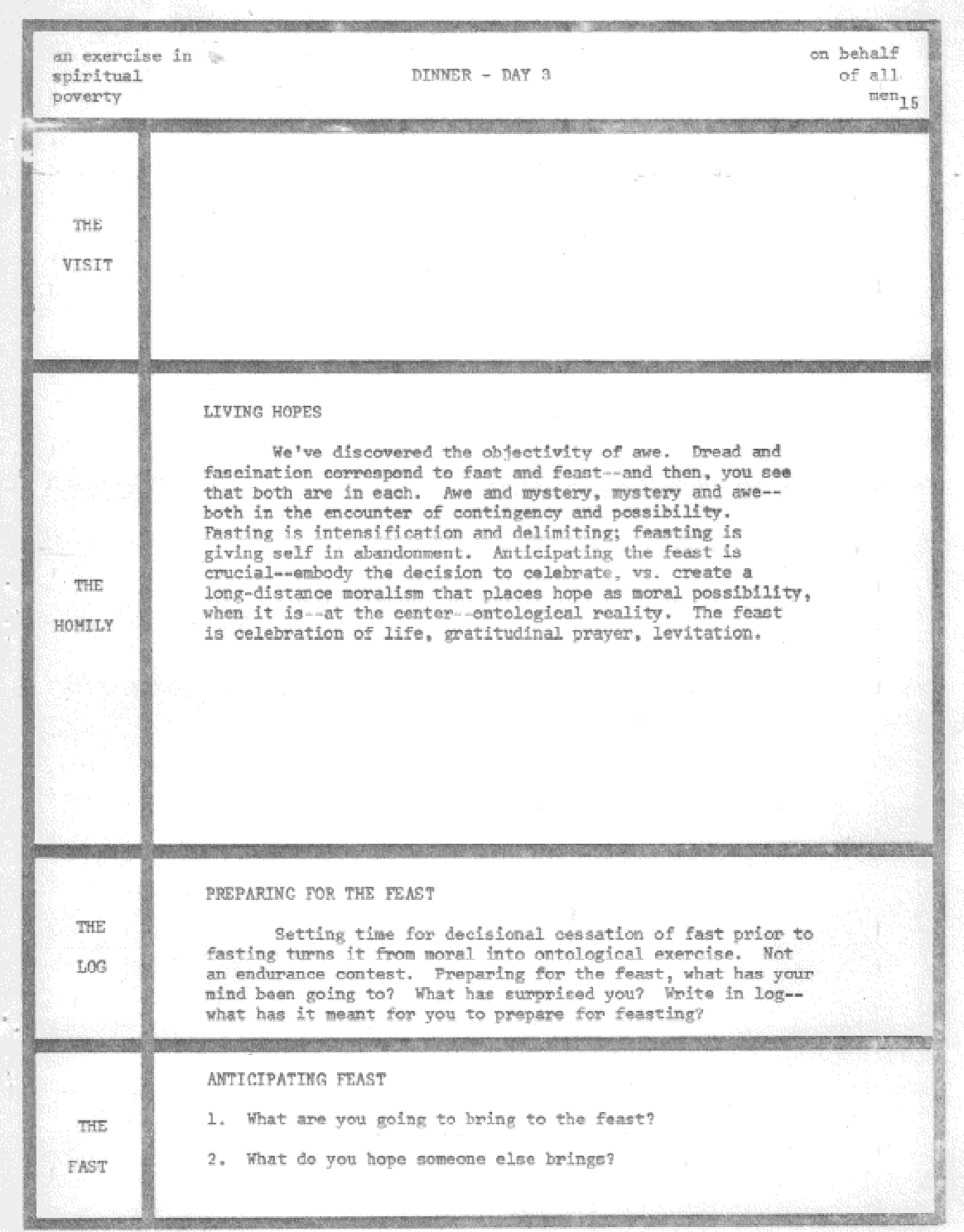 |
an exercise in spiritual poverty
on behalf of all
FEAST CONVERSATION
1. What is your name for the Fast? The Fast of
2. What are you feasting about?
3. What is your name for the Feast? The Feast of
4. What do you see that you've never seen before?
5. What was the first thing you ate?
6. If you could eat anything you wanted tomorrow, what would it be?
an exercise in on behalf of all men
spiritual AFTERFEAST REFLECTIONS
poverty -- BREAKFAST COLLEGIUM/ECCLESIOLA
MONDAY
Collegium: What reflections have you had since the Feast?
What was the Feasting about?
Ecclesiola: Where have you thought, "Now why hadn't I seen that before?" relative to the feast/fast?
What's the practical residue of fasting and feasting?
TUESDAY
Collegium: Have you noticed any change in your relationship to food?
Have you noticed any change in your relationship to space?
ECCLESIOLA: When have you thought of the Fast/Feast?
What kind of role could Fasting/Feasting play in
the renewed local church?